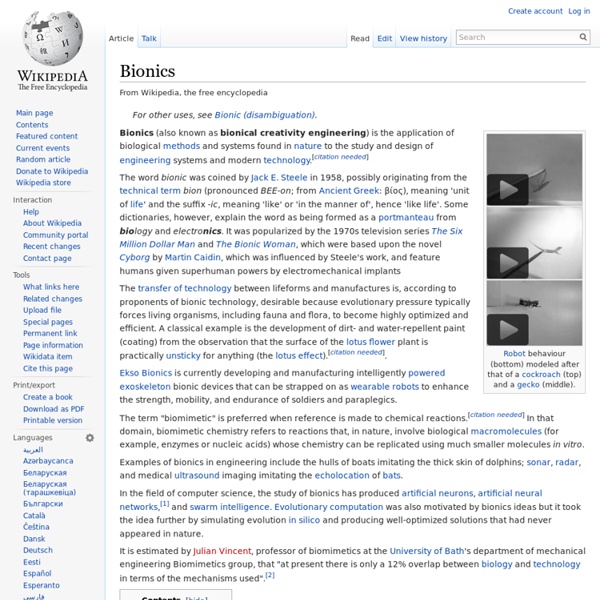Geology.com - Earth Science News, Maps, Dictionary, Articles, Jobs
Cybernetics
Cybernetics is a transdisciplinary[1] approach for exploring regulatory systems, their structures, constraints, and possibilities. Cybernetics is relevant to the study of systems, such as mechanical, physical, biological, cognitive, and social systems. Cybernetics is applicable when a system being analyzed incorporates a closed signaling loop; that is, where action by the system generates some change in its environment and that change is reflected in that system in some manner (feedback) that triggers a system change, originally referred to as a "circular causal" relationship. Some say this is necessary to a cybernetic perspective. System dynamics, a related field, originated with applications of electrical engineering control theory to other kinds of simulation models (especially business systems) by Jay Forrester at MIT in the 1950s. Norbert Wiener defined cybernetics in 1948 as "the scientific study of control and communication in the animal and the machine Definitions[edit] W. General
Robotics
Robotics is the branch of mechanical engineering, electrical engineering and computer science that deals with the design, construction, operation, and application of robots,[1] as well as computer systems for their control, sensory feedback, and information processing. These technologies deal with automated machines that can take the place of humans in dangerous environments or manufacturing processes, or resemble humans in appearance, behavior, and/or cognition. Many of today's robots are inspired by nature contributing to the field of bio-inspired robotics. The concept of creating machines that can operate autonomously dates back to classical times, but research into the functionality and potential uses of robots did not grow substantially until the 20th century.[2] Throughout history, robotics has been often seen to mimic human behavior, and often manage tasks in a similar fashion. Etymology[edit] History of robotics[edit] Robotic aspects[edit] Components[edit] Power source[edit]
Technological singularity
The technological singularity is the hypothesis that accelerating progress in technologies will cause a runaway effect wherein artificial intelligence will exceed human intellectual capacity and control, thus radically changing civilization in an event called the singularity.[1] Because the capabilities of such an intelligence may be impossible for a human to comprehend, the technological singularity is an occurrence beyond which events may become unpredictable, unfavorable, or even unfathomable.[2] The first use of the term "singularity" in this context was by mathematician John von Neumann. Proponents of the singularity typically postulate an "intelligence explosion",[5][6] where superintelligences design successive generations of increasingly powerful minds, that might occur very quickly and might not stop until the agent's cognitive abilities greatly surpass that of any human. Basic concepts Superintelligence Non-AI singularity Intelligence explosion Exponential growth Plausibility
Programming paradigm - Wikipedia, the free encyclopedia - Profile :: CareerCtr
A programming paradigm is a fundamental style of computer programming, a way of building the structure and elements of computer programs. Capablities and styles of various programming languages are defined by their supported programming paradigms; some programming languages are designed to follow only one paradigm, while others support multiple paradigms. There are six main programming paradigms: imperative, declarative, functional, object-oriented, logic and symbolic programming.[1][2][3] Overview[edit] Overview of the various programming paradigms[4]:5 In object-oriented programming, programmers can think of a program as a collection of interacting objects, while in functional programming a program can be thought of as a sequence of stateless function evaluations. Programming paradigms can also be compared with programming models which are abstractions of computer systems. History[edit] Machine code[edit] Procedural languages[edit] All these languages follow the procedural paradigm.



